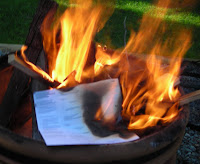 When I was browsing public access science for my recent blathering about entropy, I often came across a figure like the one on the right here as a means of explaining disorder. The dark box is subdivided into two boxes, each containing atoms of some red or blue gas, happily and randomly bouncing around. The closed system defined by the dark box is not at equilibrium (although a closed system defined by either smaller box is): there is a free energy difference, or gradient, between them. The red balls are just dying to mix it up with the blue balls, and increase the entropy of the two-box system, which happens when the doors are opened and equilibrium is attained. The idea that aspects of nature can be considered purely informational is something I find to be kind of mind-blowing. (How do they know is, classically, not as dumb a question as you might think.)
When I was browsing public access science for my recent blathering about entropy, I often came across a figure like the one on the right here as a means of explaining disorder. The dark box is subdivided into two boxes, each containing atoms of some red or blue gas, happily and randomly bouncing around. The closed system defined by the dark box is not at equilibrium (although a closed system defined by either smaller box is): there is a free energy difference, or gradient, between them. The red balls are just dying to mix it up with the blue balls, and increase the entropy of the two-box system, which happens when the doors are opened and equilibrium is attained. The idea that aspects of nature can be considered purely informational is something I find to be kind of mind-blowing. (How do they know is, classically, not as dumb a question as you might think.)
The universe is bipolar about information, positively Manichean in its twin desire to stick blocks together and to kick them down all over the room. We people, either as aspects of the universe or agents of it, are just as bad. We build vast towers that tempt gravity (a nod belongs here). We establish stolid institutions that defy our rapacious instincts. Organizing things feels good. But so does blowing shit up.
If you're inclined, you can paint this dichotomy as the individual against the collective too. While there is common agreement that we're better off with government and other public organizations, too much organization by the bigger forces of society can be a Bad Thing. I'm as uncomfortable as the next guy at the information that the corporations have on me. My mailbox fills up with their subtle tauntings. How did they know I just bought a computer? Just had a kid? Why do we get every conceivable catalogue for mail-order crap at Christmastime?
The worst are the credit card companies. I've sold my soul to the convenience of easy consumption, which makes me feel bad enough, but twice a month, these financial demons try to procreate in the post office. If I'm being a good consumer, it's full of spiffy offers and better deals. If I'm paying down the debt and not spending, they get really pissed and send tempting missives plastered with my account information. "We know," they're reminding me. "You signed the form."
If I'm particularly naughty, they send me a raft of convenience checks. All you have to do is fill out the field, and untold riches are in your hands. Naturally, I can't throw the fucking things away--it would be even worse if that vaporous wealth belonged to some creative forger instead--and I've been keeping the things for ten years in a special little trash can, awaiting their moment of shining glory. Nature abhors a pack rat.
It was getting late, and I was sobering up by the time my last college homework assignment went in the incinerator. I didn't burn it all, but there wasn't quite enough for another orgy of the same magnitude. I looked at the box of books when I came in. It's the few I could part with into the rejects bin, a handful of outdated political hit jobs (that I never read), the most unreadable romance and thriller hand me downs, and a 1972 edition of Funk and Wagnall's encyclopedia, complete but for one volume, that I bought in grad school for a buck in the pre-Google days.
Burning books is wrong, isn't it? But what possible useful bits are still contained in those volumes? No one will miss that information. It's sooo tempting...
Keifus
The Rev. Jesse Jackson (1941-2026)
-
Born in Greenville, South Carolina in 1941, he belongs in the company of
Rosa Parks, The Rev. Martin Luther King Jr., Fannie Lou Hamer, John
Lewis, and o...
19 hours ago
